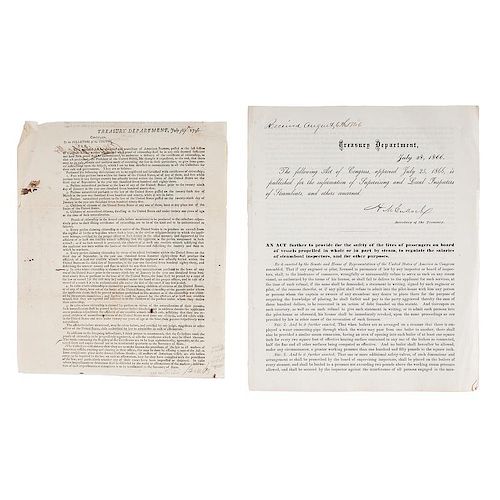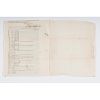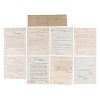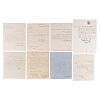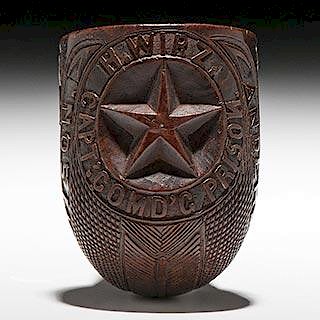Massachusetts Collector of Customs Manuscript Archive, Ca 1796-1867
About Seller
6270 Este Ave.
Cincinnati , OH 45232
United States
With offices in Cincinnati, Cleveland and Denver, Cowan’s holds over 40 auctions each year, with annual sales exceeding $16M. We reach buyers around the globe, and take pride in our reputation for integrity, customer service and great results. A full-service house, Cowan’s Auctions specializes in Am...Read more
Two ways to bid:
- Leave a max absentee bid and the platform will bid on your behalf up to your maximum bid during the live auction.
- Bid live during the auction and your bids will be submitted real-time to the auctioneer.
Bid Increments
| Price | Bid Increment |
|---|---|
| $0 | $25 |
| $500 | $50 |
| $1,000 | $100 |
| $2,000 | $250 |
| $5,000 | $500 |
| $10,000 | $1,000 |
| $20,000 | $2,500 |
| $50,000 | $5,000 |
| $100,000 | $10,000 |
About Auction
Feb 21, 2017 - Feb 22, 2017
Cowan's Auctions dawnie@cowans.com
- Lot Description
Lot of 50 (including some duplicates).
The earliest document is a circular, July 19, 1796, 7.25 x 9 in., printed, signed by Oliver Wolcott, Jr. as Secretary of the Treasury, with information about who is a citizen and what is needed to document citizenship, especially as applied to seamen. America had pledged protection of sailors who were citizens. These protections included health and safety of the men as well as protection from forced labor/recruitment. Continued British impressment would be a major factor leading to the “second revolution” in 1812.
A group of letters and circulars from the Treasury Department in Washington to the Collector of Customs in what was the Dighton, MA office, later changed to Fall River. Included is a manuscript copy of An Act to change the name of the Collection District of Dighton in the State of Massachusetts to Fall River…February 14, 1837, [Washington, DC], signed by A(?). O. Dayton.
A number of the items are requests for monthly or quarterly reports, including a manuscript DS, Washington, Department of State, October 17, 1833 to Horatio Pratt, Collector at Dighton, MA, signed by Louis McLane (M'Lane), Jackson's Secretary of the Treasury and Secretary of State. The letter acknowledges receipt of Pratt's report of "protections granted to American Seamen" for the quarter ending September 30 and goes on to inform him that the Department did not have reports for the previous two quarters.
In a document dated May 29, 1835, Wm. H. Taylor at the Collections Office informs P.W. (Phineas Washington) Leland that the Mediterranean passports signed by Thomas Jefferson were too old to use. (Jefferson had been dead nearly a decade.)
Not surprisingly, whenever there is a conflict, there is a flurry of communication. This is true during the Mexican War, and at least three of these circulars are concerned with Mexican trade.
At about the same time, there were budget issues impacting the Revenue Boat. In a letter from the Treasury Department dated January 23, 1850,…it becomes necessary, under the peremptory restriction by law of these expenses, to dispense with the use of the Revenue Boat in your district. You will therefore immediately discharge the boatmen, and lay up the boat in some secure place, signed by W.M. Meredith. Two years later, in a letter dated March 24, 1852, Fall River's request for repairs to their boat are denied, instead requesting dimensions for an order to be placed for a metal boat to replace the wooden one. In May, the new boat was ready and headed for Fall River. This letter includes a Bill of Lading for the boat. And in June, Fall River was given permission to spend up to $100 to equip the boat - sails, rigging, etc.
A portion of the documents also relate to the Civil War. They begin in August 1861 with a printed circular, Pursuant to the provisions of the act of August 6, 1861, entitled "An act requiring an oath of Allegiance, and to support the Constitution of the United States, to be administered to certain persons in the civil service of the United States,”… and signed in type by S.P. Chase, Secretary of the Treasury. Another in the fall concerned the seizure of merchandise or "vessels of insurrectionary origin" (short story - only seize items that could be "used to further the insurrection;" ignore the rest).
Then it all got reversed. A printed circular dated May 4, 1865 states: Military restrictions having been removed upon the transportation of merchandise into the following named States and parts of States, heretofore declared in insurrection, viz: Tennessee, Virginia, North Carolina, and South Carolina, and so much of the States of Florid, Alabama, Mississippi, and Louisiana lying east of the Mississippi river, as shall be declared to be within the lines of military occupation… with printed signature of H. (Hugh) McCulloch, Secretary of the Treasury. On May 6, …no steamship or other vessel departing from the United states for a foreign port of ports, shall be permitted to receive on board, or convey any letters or letter packets originating in the United States, which have not been regularly posted at, and received from, the post office at the port of departure… And on the 10th, Fall River received a "Circular Relative to Canal Boats," and a second notice regarding special agents now pressed into service as customs officers.
Even as the United States was "normalizing," war broke out between Spain and Peru. This affected shipping to and from those nations. In March 1866, Customs was regulating the importation of cattle and hides, “…to prevent the spread of foreign diseases among the cattle of the United States….”
A printed circular from Treasury dated April 3, 1866 provides evidence that as long as there has been trade, there has been fraud. It notes, This Department is informed that frequent attempts are being made to import into the various ports of the United States certain merchandise purporting to be Essence of Cayenne; Essence of Ginger Tincture of Camphor, Tincture of Myrhh, &c., &c., which have been found, upon examination, to be composed almost wholly of Alcohol, with but a small proportion of other ingredients to give the color, taste, or flavor of Essences and Tinctures….in every instance where any merchandise as above described is entered, … that the article is not intended to be used as an Essence, Extract, Tincture, &c., as represented, but that the real object of the Importer is to introduce the Alcohol at a lower rate of duty than is provided for in the law…”
In a rather lengthy and technical circular of July 28, 1866, with the title, An Act further to provide for the safety of the lives of passengers on board of vessels propelled in whole or in part by steam…, the beginning of the act goes into great detail about the arrangement of boilers, their connections and their heat source. And no boiler shall hereafter be allowed, under any circumstances, a greater working pressure than one hundred and fifty pounds to the square inch… And steamers hereafter built, which shall employ four or more boilers set in a battery, shall have the same divided in such a manner that one-half, so far as nearly as may be, of the number of boilers employed will act independently of the other half, so far as relates to the water connexion; … and a good and reliable water-gauge and a full set of gauge-cocks be provided for each boiler, whether connected or otherwise. … That all sea-going vessels carrying passengers, and those navigating any of the northern and northwestern lakes, shall have the life-boats required by law… The act also regulated what packets which carried cargo and passengers could carry (especially flammable materials such as cotton and petroleum), the thickness of boiler walls, and specified that the boats have life-jackets, etc. There were further restrictions on inspectors and clerks, as well as pay specifications (presumably to reduce the temptation to take bribes).
Many of these regulations appear to be the result of the disaster involving the steamship Sultana in April 1865. In addition to carrying six times the Sultana's legal limit, including over 2000 just-released Union POWs, one of the steamer's boilers sprung a leak on the morning of April 27, 1865. Although a patch of metal was placed over the bulge in the boiler, it exploded, causing two of the three other boilers to explode. Some 1,700 people died as a result of the explosion and aftermath, making this the worst maritime disaster in US history.
The few later letters and circulars included in the lot concern "normal" activities. Requests for quarterly reports, how to register a ship that has undergone extensive modification, etc. Many, if not most, of these circulars relate to everyday activities of the Customs officers, but the first century of the nation's existence was a turbulent time. The changes necessary to accommodate these events are reflected throughout the archive.
Provenance: N. Flayderman and Co., Inc.Many have notes on dates received from Washington. Most are disbound from another volume (at least two different ones, judging by the configuration of holes along the left edge). Overall very good, as they were apparently protected in binders or boards for many years.Condition
- Shipping Info
-
SHIPPING. At the request of the buyer, Cowan's will authorize the shipment of purchased items. Shipments usually occur within two weeks after payment has been received. Shipment is generally made via UPS Ground service. Unless buyer gives special instructions, the shipping method shall be at the sole discretion of Cowan's Auctions, Inc.. Cowan's is in no way responsible for the acts or omissions of independent handlers, packers or shippers of purchased items or for any loss, damage or delay from the packing or shipping of any property.
-
- Buyer's Premium



 EUR
EUR CAD
CAD AUD
AUD GBP
GBP MXN
MXN HKD
HKD CNY
CNY MYR
MYR SEK
SEK SGD
SGD CHF
CHF THB
THB